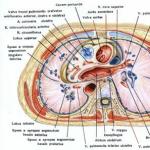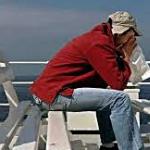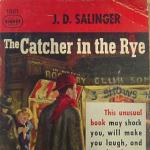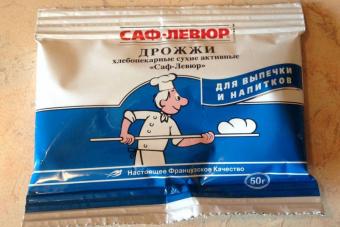22 years ago, on December 26, 1991, the Supreme Soviet of the USSR adopted a declaration on the cessation of existence Soviet Union, and the country in which most of us were born is gone. Over the 69 years of the existence of the USSR, seven people became its head, whom I propose to remember today. And not just remember, but also choose the most popular of them.
And since New Year soon after all, and considering that in the Soviet Union the popularity and attitude of the people towards their leaders was measured, among other things, by the quality of the jokes written about them, I think it would be appropriate to remember the Soviet leaders through the prism of jokes about them.
.
Now we have almost forgotten what a political joke is - most jokes about current politicians are paraphrased jokes from Soviet times. Although there are also witty and original ones, for example, here is an anecdote from the time Yulia Tymoshenko was in power: There is a knock on Tymoshenko’s office, the door opens, a giraffe, a hippopotamus and a hamster enter the office and ask: “Yulia Vladimirovna, how will you comment on the rumors that you use drugs?”.
In Ukraine, the situation with humor about politicians is generally somewhat different than in Russia. In Kyiv they believe that it is bad for politicians if they are not laughed at, it means they are not interesting to the people. And since in Ukraine they still make elections, the PR services of politicians even order laughs at their bosses. It is no secret, for example, that the most popular Ukrainian “95th Quarter” takes money to ridicule the person who paid. This is the fashion for Ukrainian politicians.
Yes, they themselves sometimes don’t mind making fun of themselves. There was once a very popular anecdote about oneself among Ukrainian deputies: The session of the Verkhovna Rada ends, one deputy says to another: “It was such a difficult session, we need to rest. Let's go out of town, take a few bottles of whiskey, rent a sauna, take girls, have sex...” He answers: “How? In front of girls?!!”.
But let's return to the Soviet leaders.
.
The first ruler of the Soviet state was Vladimir Ilyich Lenin. For a long time The image of the leader of the proletariat was beyond the reach of jokes, but during the Khrushchev and Brezhnev times in the USSR, the number of Leninist motives in Soviet propaganda increased sharply.
And the endless glorification of Lenin’s personality (as it usually happened in almost everything in the Union) led to the exact opposite desired result- to the appearance of many jokes ridiculing Lenin. There were so many of them that even jokes about jokes about Lenin appeared.

.
In honor of the centenary of Lenin's birth, a competition has been announced for the best political joke about Lenin.
3rd prize - 5 years in Lenin's places.
2nd prize - 10 years of strict regime.
1st prize - meeting with the hero of the day.
This is largely explained by the tough policy pursued by Lenin’s successor Joseph Vissarionovich Stalin, who in 1922 took the post of General Secretary of the CPSU Central Committee. There were also jokes about Stalin, and they remained not only in the materials of the criminal cases brought against them, but also in people’s memory.
Moreover, in jokes about Stalin one can feel not only a subconscious fear of the “father of all nations,” but also respect for him, and even pride in their leader. Some kind of mixed attitude towards power, which apparently was passed on to us from generation to generation at the genetic level.

.
- Comrade Stalin, what should we do with Sinyavsky?
- Which Synavsky is this? Football announcer?
- No, Comrade Stalin, writer.
- Why do we need two Synavskys?
On September 13, 1953, shortly after the death of Stalin (March 1953), Nikita Sergeevich Khrushchev became the first secretary of the CPSU Central Committee. Since Khrushchev’s personality was filled with deep contradictions, they were reflected in jokes about him: from undisguised irony and even contempt for the leader of the state to a rather friendly attitude towards Nikita Sergeevich himself and his peasant humor.

.
The pioneer asked Khrushchev:
- Uncle, dad said the truth, that you launched not only a satellite, but also agriculture?
- Tell your dad that I plant more than just corn.
On October 14, 1964, Khrushchev was replaced as First Secretary of the CPSU Central Committee by Leonid Ilyich Brezhnev, who, as you know, was not averse to listening to jokes about himself - their source was Brezhnev’s personal hairdresser Tolik.
In a certain sense, the country was lucky then, because what came to power, as everyone soon became convinced, was a kindly, non-cruel man who did not make any special moral demands on himself, his comrades, or the Soviet people. And the Soviet people responded to Brezhnev with the same anecdotes about him - kindly and not cruel.

.
At a Politburo meeting, Leonid Ilyich pulled out a piece of paper and said:
- I want to make a statement!
Everyone looked attentively at the piece of paper.
“Comrades,” Leonid Ilyich began to read, “I want to raise the issue of senile sclerosis. Things have gone too far. Vshera at the funeral of comrade Kosygin...
Leonid Ilyich looked up from the piece of paper.
- For some reason I don’t see him here... So, when the music started playing, I was the only one who thought of asking the lady to dance!..
On November 12, 1982, Brezhnev’s place was taken by Yuri Vladimirovich Andropov, who previously headed the Committee state security, and adhered to a rigid conservative position on fundamental issues.
The course proclaimed by Antropov was aimed at socio-economic transformations through administrative measures. The harshness of some of them seemed unusual to the Soviet people in the 1980s, and they responded with appropriate anecdotes.

On February 13, 1984, the post of head of the Soviet state was taken by Konstantin Ustinovich Chernenko, who was considered a contender for the post of General Secretary even after Brezhnev’s death.
He was elected as a transitional intermediate figure in the CPSU Central Committee while it was undergoing a struggle for power between several party groups. Chernenko spent a significant part of his reign at the Central Clinical Hospital.

.
The Politburo decided:
1. Appoint Chernenko K.U. General Secretary of the CPSU Central Committee.
2. Bury him on Red Square.
On March 10, 1985, Chernenko was replaced by Mikhail Sergeevich Gorbachev, who carried out numerous reforms and campaigns that ultimately led to the collapse of the USSR.
And Soviet political jokes about Gorbachev, accordingly, ended.

.
- What is the peak of pluralism?
- This is when the opinion of the President of the USSR absolutely does not coincide with the opinion of the General Secretary of the CPSU Central Committee.
Well, now the poll.
Which leader of the Soviet Union, in your opinion, was the best ruler of the USSR?
Vladimir Ilyich Lenin
23 (6.4 % )
Joseph Vissarionovich Stalin
114 (31.8 % )
Soviet party and statesman.
First Secretary of the CPSU Central Committee since 1964 (since 1966 General Secretary) and Chairman of the Presidium Supreme Council USSR in 1960-1964. and since 1977
Marshal of the Soviet Union, 1976
Biography of Brezhnev
Leonid Ilyich Brezhnev born on December 19, 1906 in the village of Kamenskoye, Ekaterinoslav province (now Dneprodzerzhinsk).
L. Brezhnev's father, Ilya Yakovlevich, was a metallurgist. Brezhnev's mother, Natalya Denisovna, had the surname Mazelova before her marriage.
In 1915, Brezhnev entered the zero class of a classical gymnasium.
In 1921, Leonid Brezhnev graduated labor school, got his first job at the Kursk Oil Mill.
The year 1923 was marked by joining the Komsomol.
In 1927, Brezhnev graduated from the Kursk Land Management and Reclamation College. After studying, Leonid Ilyich worked for some time in Kursk and Belarus.
In 1927 - 1930 Brezhnev holds the position of land surveyor in the Urals. Later he became the head of the district land department, was deputy chairman of the District Executive Committee, and deputy head of the Ural Regional Land Department. He took an active part in collectivization in the Urals.
In 1928 Leonid Brezhnev got married.
In 1931, Brezhnev joined the All-Russian Communist Party of the Bolsheviks.
In 1935, he received a diploma from the Dneprodzerzhinsk Metallurgical Institute, being a party organizer.
In 1937 he entered the metallurgical plant named after. F.E. Dzerzhinsky as an engineer and immediately received the position of deputy chairman of the Dneprodzerzhinsk City Executive Committee.
In 1938, Leonid Ilyich Brezhnev was appointed head of the department of the Dnepropetrovsk Regional Committee of the All-Union Communist Party of Bolsheviks, and a year later he received the position of secretary in the same organization.
During the Great Patriotic War Brezhnev ranks  leadership positions: deputy Head of the Political Department of the 4th Ukrainian Front, Head of the Political Department of the 18th Army, Head of the Political Department of the Carpathian Military District. He ended the war with the rank of major general, although he had “very weak military knowledge.”
leadership positions: deputy Head of the Political Department of the 4th Ukrainian Front, Head of the Political Department of the 18th Army, Head of the Political Department of the Carpathian Military District. He ended the war with the rank of major general, although he had “very weak military knowledge.”
In 1946, L.I. Brezhnev was appointed 1st Secretary of the Zaporozhye Regional Committee of the Communist Party of Ukraine (Bolsheviks), and a year later he was transferred to the Dnepropetrovsk Regional Committee in the same position.
In 1950, he became a deputy of the Supreme Soviet of the USSR, and in July of the same year - 1st Secretary of the Central Committee of the Communist Party (Bolsheviks) of Moldova.
In October 1952, Brezhnev received from Stalin the position of Secretary of the CPSU Central Committee and became a member of the Central Committee and a candidate member of the Presidium of the Central Committee.
After the death of I.V. Stalin in 1953, the rapid career of Leonid Ilyich was interrupted for a while. He was demoted and was appointed 1st Deputy Head of the Main Political Directorate Soviet army and the fleet.
1954 - 1956, the famous uplifting of virgin soil in Kazakhstan. L.I. Brezhnev  successively holds the positions of 2nd and 1st Secretary of the Central Committee of the Communist Party of the Republic.
successively holds the positions of 2nd and 1st Secretary of the Central Committee of the Communist Party of the Republic.
In February 1956, he regained his position as Secretary of the Central Committee.
In 1956, Brezhnev became a candidate, and a year later a member of the Presidium of the CPSU Central Committee (in 1966, the organization was renamed the Politburo of the CPSU Central Committee). In this position, Leonid Ilyich led knowledge-intensive industries, including space exploration.
Buying a higher education diploma means securing a happy and successful future for yourself. Nowadays, without documents of higher education you will not be able to get a job anywhere. Only with a diploma can you try to get into a place that will bring not only benefits, but also pleasure from the work performed. Financial and social success, high social status– that’s what having a higher education diploma brings.
Immediately after finishing their last school year, most of yesterday's students already firmly know which university they want to enroll in. But life is unfair, and situations are different. You may not get into your chosen and desired university, and other educational institutions seem unsuitable for a variety of reasons. Such a “trips” in life can knock any person out of the saddle. However, the desire to become successful does not go away.
The reason for the lack of a diploma may also be the fact that you were unable to take a budget place. Unfortunately, the cost of education, especially at a prestigious university, is very high, and prices are constantly creeping up. These days, not all families can pay for their children’s education. So financial issue may cause the lack of educational documents.
The same problems with money can become a reason for yesterday’s high school student to go to work in construction instead of university. If family circumstances suddenly change, for example, the breadwinner passes away, there will be nothing to pay for education, and the family needs to live on something.
It also happens that everything goes well, you manage to successfully enter a university and everything is fine with your studies, but love happens, a family is formed and you simply don’t have enough strength or time to study. In addition, much more money is needed, especially if a child appears in the family. Paying for tuition and supporting a family is extremely expensive and you have to sacrifice your diploma.
Obstacle to obtaining higher education It may also be that the university chosen for the specialty is located in another city, perhaps quite far from home. Studying there can be hampered by parents who do not want to let their child go, the fears that a young man who has just graduated from school may experience in front of an unknown future, or the same lack of necessary funds.
As you can see, there are a huge number of reasons for not getting the required diploma. However, the fact remains that without a diploma, counting on a well-paid and prestigious job is a waste of time. At this moment, the realization comes that it is necessary to somehow solve this issue and get out of the current situation. Anyone who has time, energy and money decides to go to university and receive a diploma through the official means. Everyone else has two options - not to change anything in their lives and remain to vegetate on the outskirts of fate, and the second, more radical and courageous - to buy a specialist, bachelor's or master's degree. You can also purchase any document in Moscow
However, those people who want to get settled in life need a document that will be no different from the original document. That is why it is necessary to pay maximum attention to the choice of the company to which you will entrust the creation of your diploma. Take your choice with maximum responsibility, in this case you will have a great chance to successfully change the course of your life.
In this case, no one will ever be interested in the origin of your diploma - you will be assessed solely as a person and an employee.
Purchasing a diploma in Russia is very easy!
Our company successfully fulfills orders for a variety of documents - buy a certificate for 11 classes, order a college diploma or purchase a vocational school diploma and much more. Also on our website you can buy marriage and divorce certificates, order birth and death certificates. We complete the work in a short time, and undertake the creation of documents for urgent orders.
We guarantee that by ordering any documents from us, you will receive them on time, and the papers themselves will be of excellent quality. Our documents are no different from the originals, since we use only real GOZNAK forms. This is the same type of documents that an ordinary university graduate receives. Their complete identity guarantees your peace of mind and the ability to get any job without the slightest problem.
To place an order, you only need to clearly define your desires by choosing the desired type of university, specialty or profession, and also indicating the correct year of graduation from the higher educational institution. This will help confirm your story about your studies if you are asked about receiving your diploma.
Our company has been successfully working on creating diplomas for a long time, so it knows perfectly well how to prepare documents for different years of graduation. All our diplomas in the smallest details correspond to similar original documents. Confidentiality of your order is a law for us that we never violate.
We will quickly complete your order and deliver it to you just as quickly. To do this, we use the services of couriers (for delivery within the city) or transport companies that transport our documents throughout the country.
We are confident that the diploma purchased from us will be the best assistant in your future career.
Advantages of purchasing a diploma
Purchasing a diploma with entry into the register has the following advantages:
- Saving time for many years of training.
- The ability to acquire any higher education diploma remotely, even in parallel with studying at another university. You can have as many documents as you wish.
- A chance to indicate the desired grades in the “Appendix”.
- Saving a day on the purchase, while officially receiving a diploma with posting in St. Petersburg costs much more than a finished document.
- Official proof of higher education educational institution according to the specialty you need.
- Having a higher education in St. Petersburg will open all the roads for quick career advancement.
My labor activity began after finishing 4 classes of the zemstvo school in the house of the nobleman Morduchai-Bolotovsky. Here he served as a footman.
Then there were difficult ordeals in search of work, later a position as an apprentice under a turner at the Old Arsenal gun factory.
And then there was the Putilov plant. Here he first encountered underground revolutionary organizations of workers, whose activities he had long heard about. He immediately joined them, joined the Social Democratic Party and even organized his own educational circle at the plant.
After his first arrest and release, he left for the Caucasus (he was prohibited from living in St. Petersburg and the surrounding area), where he continued his revolutionary activities.
After a brief second imprisonment, he moved to Revel, where he also actively established connections with revolutionary figures and activists. He begins to write articles for Iskra, collaborates with the newspaper as a correspondent, distributor, liaison, etc.
Over the course of several years, he was arrested 14 times! But he continued his activities. By 1917, he played an important role in the Petrograd Bolshevik organization and was elected a member of the executive commission of the St. Petersburg party committee. Actively participated in the development of the revolutionary program.
At the end of March 1919, Lenin personally proposed his candidacy for the post of chairman of the All-Russian Central Executive Committee. At the same time, F. Dzerzhinsky, A. Beloborodov, N. Krestinsky and others applied for this post.
The first document that Kalinin presented during the meeting was a declaration containing the immediate tasks of the All-Union Central Executive Committee.
During the civil war, he often visited the fronts, conducted active propaganda work among the fighters, and traveled to villages and villages, where he held conversations with peasants. Despite his high position, he was easy to communicate and knew how to find an approach to anyone. In addition, he himself was from a peasant family and worked at a factory for many years. All this inspired confidence in him and forced people to listen to his words.
For many years, people faced with a problem or injustice wrote to Kalinin, and in most cases received real help.
In 1932, thanks to him, the operation to deport several tens of thousands of dispossessed families and expelled from collective farms was stopped.
After the end of the war, issues of economic and social development countries. Together with Lenin, he developed plans and documents for electrification, restoration of heavy industry, the transport system and agriculture.
It could not have been done without him when choosing the statute of the Order of the Red Banner of Labor, drawing up the Declaration on the Formation of the USSR, the Union Treaty, the Constitution and other significant documents.
During the 1st Congress of Soviets USSR he was elected one of the chairmen of the Central Executive Committee of the USSR.
The main activity in foreign policy there was work to recognize the country of Soviets by other states.
In all his affairs, even after Lenin's death, he clearly adhered to the line of development outlined by Ilyich.
On the first day of winter 1934 he signed a decree, which subsequently gave the green light for mass repressions.
In January 1938 he became chairman of the Presidium of the Supreme Soviet of the USSR. He worked in this position for more than 8 years. He resigned from his post a few months before his death.
Who ruled after Stalin in the USSR? It was Georgy Malenkov. His political biography was a truly phenomenal combination of both ups and downs. At one time, he was considered the successor to the leader of the peoples and was even the de facto leader of the Soviet state. He was one of the most experienced apparatchiks and was famous for his ability to think many moves ahead. In addition, the one who was in power after Stalin had a unique memory. On the other hand, he was expelled from the party during the Khrushchev era. They say that he has not yet been rehabilitated, unlike his associates. However, the one who ruled after Stalin was able to withstand all this and remain faithful to his cause to death. Although, they say, in his old age he overestimated a lot...
Career start
Georgy Maximilianovich Malenkov was born in 1901 in Orenburg. His father worked for railway. Despite the fact that noble blood flowed in his veins, he was considered a rather minor employee. His ancestors came from Macedonia. The grandfather of the Soviet leader chose the army path, was a colonel, and his brother was a rear admiral. The party leader’s mother was the daughter of a blacksmith.
In 1919, after graduating from a classical gymnasium, Georgy was drafted into the Red Army. On next year he joined the Bolshevik Party, becoming a political worker for an entire squadron.
After the Civil War, he studied at the Bauman School, but, having quit his studies, began working in the Organizing Bureau of the Central Committee. It was 1925.
Five years later, under the patronage of L. Kaganovich, he began to head the organizational department of the capital city committee of the CPSU (b). Note that Stalin really liked this young official. He was intelligent and devoted to the General Secretary...

Malenkov selection
In the second half of the 30s, purges of the opposition took place in the capital's party organization, which became a prelude to future political repressions. It was Malenkov who then led this “selection” of the party nomenklatura. Later, with the sanction of the functionary, almost all the old communist cadres were repressed. He himself came to the regions in order to intensify the fight against “enemies of the people.” Sometimes he witnessed interrogations. True, the functionary, in fact, was only an executor of the direct instructions of the leader of the peoples.
On the roads of war
When the Great Patriotic War broke out, Malenkov managed to show his organizational talent. He had to professionally and quite quickly solve many economic and personnel issues. He always supported developments in the tank and missile industries. In addition, it was he who gave Marshal Zhukov the opportunity to stop the seemingly inevitable collapse of the Leningrad Front.
In 1942, this party leader ended up in Stalingrad and was involved, among other things, in organizing the defense of the city. On his orders, the city population began to evacuate.
In the same year, thanks to his efforts, the Astrakhan defensive region was strengthened. Thus, in the Volga and Caspian flotillas appeared modern boats and other watercraft.
Later he took an active part in preparing the battle on Kursk Bulge, after which he focused on the restoration of the liberated territories, heading the corresponding committee.

Post-war time
Malenkov Georgy Maximilianovich began to turn into the second figure in the country and party.
When the war ended, he dealt with issues related to the dismantling of German industry. By and large, this work was constantly criticized. The fact is that many of the influential departments tried to get this equipment. As a result, a corresponding commission was created, which adopted unexpected decision. German industry was no longer dismantled, and enterprises that were based in the territories of East Germany began to produce goods for the Soviet Union as reparations.
Rise of a functionary
In mid-autumn 1952, the Soviet leader instructed Malenkov to deliver a report at the next congress of the Communist Party. Thus, the party functionary was essentially presented as Stalin’s successor.
Apparently, the leader nominated him as a compromise figure. It suited both the party leadership and the security forces.
A few months later, Stalin was no longer alive. And Malenkov, in turn, became the head of the Soviet government. Of course, before him this post was occupied by the deceased Secretary General.

Malenkov reforms
Malenkov's reforms began literally immediately. Historians also call them “perestroika” and believe that this reform could greatly change the entire structure of the national economy.
The head of government in the period after Stalin's death announced to the people absolutely new life. He promised that the two systems - capitalism and socialism - would coexist peacefully. He was the first leader of the Soviet Union to warn against atomic weapons. In addition, he intended to put an end to the policy of the cult of personality by moving to collective leadership of the state. He recalled that the late leader criticized members of the Central Committee for the cult planted around him. True, there was no significant reaction to this proposal from the new prime minister at all.
In addition, the one who ruled after Stalin and before Khrushchev decided to lift a number of prohibitions - on crossing borders, foreign press, customs transit. Unfortunately, new chapter tried to present this policy as a natural continuation of the previous course. That is why Soviet citizens, in fact, not only did not pay attention to “perestroika”, but also did not remember it.

Decline of a career
By the way, it was Malenkov, as the head of government, who came up with the idea of halving the remuneration of party officials, that is, the so-called. "envelopes". By the way, before him, Stalin also proposed the same thing shortly before his death. Now, thanks to the corresponding resolution, this initiative was implemented, but it caused even greater irritation on the part of the party nomenklatura, including N. Khrushchev. As a result, Malenkov was removed from office. And his entire “perestroika” was practically curtailed. At the same time, “ration” bonuses for officials were restored.
Nevertheless, the former head of government remained in the cabinet. He led all Soviet power plants, which began to operate much more successfully and efficiently. Malenkov also promptly resolved issues related to the social welfare of employees, workers and their families. Accordingly, all this increased his popularity. Although she was tall without it. But in the middle of the summer of 1957, he was “exiled” to the hydroelectric power station in Ust-Kamenogorsk, in Kazakhstan. When he arrived there, the whole city rose to greet him.
Three years later former minister already headed the thermal power plant in Ekibastuz. And also upon arrival, many people appeared carrying his portraits...
Many did not like his well-deserved fame. And the very next year, the one who was in power after Stalin was expelled from the party and sent into retirement.

Recent years
Once retired, Malenkov returned to Moscow. He retained some privileges. In any case, he bought food in a special store for party officials. But, despite this, he periodically went to his dacha in Kratovo by train.
And in the 80s, the one who ruled after Stalin suddenly turned to Orthodox faith. This was, perhaps, his last “turn” of fate. Many saw him in the temple. In addition, he periodically listened to radio programs about Christianity. He also became a reader in churches. By the way, during these years he lost a lot of weight. This is probably why no one touched him or recognized him.
He passed away at the very beginning of January 1988. He was buried at the Novokuntsevo churchyard in the capital. Note that he was buried according to Christian rites. There were no reports of his death in the Soviet media of those times. But in Western periodicals there were obituaries. And very extensive...





